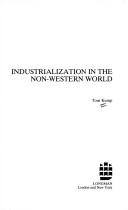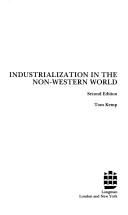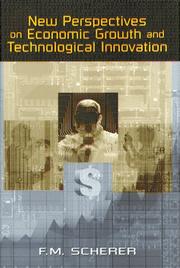| Listing 1 - 10 of 34 | << page >> |
Sort by
|

ISBN: 3534041623 9783534041626 Year: 1971 Volume: 176 Publisher: Darmstadt : Wissenschaftliche Buchgesellschaft,
Abstract | Keywords | Export | Availability | Bookmark
 Loading...
Loading...Choose an application
- Reference Manager
- EndNote
- RefWorks (Direct export to RefWorks)
Economic development --- History --- Economic development. --- Economic development - History - 20th century

ISBN: 0582492343 9780582492349 Year: 1985 Publisher: London Longman
Abstract | Keywords | Export | Availability | Bookmark
 Loading...
Loading...Choose an application
- Reference Manager
- EndNote
- RefWorks (Direct export to RefWorks)
Economic development --- Industrialization --- History. --- History --- Industrialization - History --- Economic development - History

ISBN: 0582021820 9780582021822 Year: 1993 Publisher: London Longman
Abstract | Keywords | Export | Availability | Bookmark
 Loading...
Loading...Choose an application
- Reference Manager
- EndNote
- RefWorks (Direct export to RefWorks)
Economic development --- Industrialization --- History --- Industrialisation --- Développement économique --- Histoire --- Industrialization - History. --- Economic development - History. --- Industrialization - History --- Economic development - History
Digital
Year: 1789 Publisher: Firenze Giuseppe Tofani
Abstract | Keywords | Export | Availability | Bookmark
 Loading...
Loading...Choose an application
- Reference Manager
- EndNote
- RefWorks (Direct export to RefWorks)

ISBN: 0815777949 0815796536 0815777957 9780815777953 9780815777946 Year: 1999 Publisher: Washington, D.C. Brookings Institution
Abstract | Keywords | Export | Availability | Bookmark
 Loading...
Loading...Choose an application
- Reference Manager
- EndNote
- RefWorks (Direct export to RefWorks)
A Brookings Institution Press and British-North American Committee publication Two hundred years ago, the first Industrial Revolution sparked a dramatic acceleration in the quantity of goods and services available to the average citizen--a trend of steadily increasing real income per capita that continues to this day. Since that time, economists have struggled to develop systematic explanations for what caused the sudden, rapid increase, why the economy keeps growing, and why the rate of growth varies in different time periods and nations. In this book, F. M. Scherer traces the evolution of economic growth theory from the Industrial Revolution to the present. Emphasizing technological change as the most crucial dynamic force for growth, Scherer analyzes early hypotheses that paid little attention to new technologies, follows the emergence of theories that increasingly emphasized technological change, and reviews the current state of economic growth theory. Pointing out a lack of solid microbehavioral foundations to support contemporary "new growth" ideas, Scherer then supplies some foundational "bricks" concerning financial investment and human capital, and concludes by exploring the prospects for sustaining rapid growth into the next century.
Economic growth --- Economic production --- Economic development --- Technological innovations --- History --- Economic aspects --- History. --- Economic development - History --- Technological innovations - Economic aspects - History
Book
ISBN: 0907582176 9780907582175 Year: 1985 Publisher: Leamington Spa
Abstract | Keywords | Export | Availability | Bookmark
 Loading...
Loading...Choose an application
- Reference Manager
- EndNote
- RefWorks (Direct export to RefWorks)
Book
ISBN: 9782355260896 2355260893 Year: 2011 Publisher: Paris : Lignes,
Abstract | Keywords | Export | Availability | Bookmark
 Loading...
Loading...Choose an application
- Reference Manager
- EndNote
- RefWorks (Direct export to RefWorks)
Septembre 2008, la crise mondiale sans précédent de la dette privée entraîne la faillite de la banque d'investissement américaine Lehman Brothers. Juillet 2011, la crise s'est étendue à la dette souveraine et menace plusieurs États européens de faillite. Dans les textes ici rassemblés (2007-2010), Robert Kurz montre que le capitalisme n'est pas victime d'un déséquilibre momentané, mais d'une contradiction interne qui le conduit à son effondrement inexorable. Il montre comment, dans ce contexte de crise finale, les diverses politiques économiques sont vouées à l'échec. Comment la gauche officielle participe à la gestion de crise. Et comment les solutions avancées par les «anticapitalistes» autoproclamés sont autant d'impasses (rien d'autre, selon lui, qu'un néo-capitalisme d'État). Enfin, Robert Kurz s'emploie à critiquer les formes de conscience constituées par le capital, c'est-à-dire l'idéologie qui fait que les hommes ont intériorisé les conditions de vie capitalistes comme les seules possibles et, pour cette raison, ne peuvent imaginer d'en sortir.
Capitalism --- Economic development --- Depressions --- Marxist criticism --- History --- Capitalisme --- Crise économique (2008) --- Philosophie. --- Capitalism - Marxist criticism --- Economic development - History - 21st century --- Capitalism - History - 21st century --- Depressions - 2008
Book
ISBN: 9781108453479 9781108678940 9781316515884 9781108674584 1108674585 9781108626316 1108626319 1108678947 1316515885 1108453473 Year: 2018 Publisher: Cambridge, England : Cambridge University Press,
Abstract | Keywords | Export | Availability | Bookmark
 Loading...
Loading...Choose an application
- Reference Manager
- EndNote
- RefWorks (Direct export to RefWorks)
This anthology offers a cutting-edge perspective on how development has shaped the history of the modern world. Stephen J. Macekura and Erez Manela have gathered together leading historians to examine development on the international, regional, and national levels, as well as local manifestations of development initiatives and transnational organizing on behalf of alternative approaches. Themes include the relationship between empire and development, the role of international institutions, the influence of the Cold War, decolonization and post-colonial development strategies, reform and resistance to development, development and global health, and the ecological effects of development. The Development Century examines how ideas and discourses about development have shaped its practices on the ground; explores the ways in which policymakers and experts attempted to implement development through specific institutions and policies; and analyzes development initiatives and their effect of local environments and people.
Economic development --- Economic history --- Globalization --- Economic conditions --- History, Economic --- Economics --- History --- Economic history. --- History. --- 331.04 --- 331.100 --- Langdurige bewegingen --- Economische geschiedenis: algemeenheden --- Economic development - History --- Globalization - History
Book
ISBN: 9781107104709 9781107507180 110710470X 1107507189 Year: 2017 Publisher: Cambridge Cambridge University Press
Abstract | Keywords | Export | Availability | Bookmark
 Loading...
Loading...Choose an application
- Reference Manager
- EndNote
- RefWorks (Direct export to RefWorks)
Why are some parts of the world poor today, while others are rich? At which point in time did they diverge, and what were the reasons? These core questions are addressed in a concise and accessible introduction to global economic development since 1500. Leading economic historians from across the globe provide overviews of major world regions together with global comparison chapters and case studies highlighting key themes, individuals, processes and events. Utilising a set of common developmental indicators, the chapters address crucial issues such as how international trade and migration, institutions and flows of physical and human capital impacted economic growth. Richly illustrated with informative figures, maps, tables and charts, "A History of the Global Economy" summarises the key economic findings, debates and ideas and provides students and the interested public with an up-to-date and engaging introduction to the origins and evolution of today's global economy.
World history --- anno 1500-1799 --- anno 1800-1999 --- Economic history. --- Economic development --- Economic conditions --- History, Economic --- Economics --- History. --- Histoire économique --- Développement économique --- Histoire --- Economic History --- History --- Economic development. --- Histoire. --- Economic history --- Economic development - History
Book
ISSN: 12981990 ISBN: 9782356133465 2356133461 Year: 2020 Volume: 140 Publisher: Bordeaux Ausonius éditions
Abstract | Keywords | Export | Availability | Bookmark
 Loading...
Loading...Choose an application
- Reference Manager
- EndNote
- RefWorks (Direct export to RefWorks)
Les économies de l'Antiquité changent, et elles changent profondément. Il n'y a pas une seule économie antique, plus ou moins identique à elle-même d'Homère à Constantin. Les contributions rassemblées dans ce livre instaurent un dialogue entre historiens des textes, archéologues, technologues et environnementalistes pour comprendre les ressorts de ces transformations. Elles abandonnent ainsi le primitivisme de la stagnation aussi bien que le fétichisme de la croissance. De l'Inde à l'Atlantique, de l'âge du Bronze au début du Moyen Âge, en accordant la première place à l'évaluation des sources existantes et à la production de données nouvelles, elles suivent certains produits et certaines techniques (céréales, dattes, coton, salaisons, poivre, perles, mouture) de leur mise au point à leur diffusion, sans cacher les revers et les retours. C'est la diversité et les dynamiques des mondes antiques, dans leur originalité profonde, qui se révèlent ici.
Civilisation antique --- Histoire économique --- Agriculture --- Céréales --- Aspect économique. --- Histoire. --- Economic history --- Economic development --- History --- Farm produce --- History. --- Mediterranean Region --- Economic conditions --- Economic history - To 500 --- Economic development - History - To 1500
| Listing 1 - 10 of 34 | << page >> |
Sort by
|

 Search
Search Feedback
Feedback About UniCat
About UniCat  Help
Help News
News